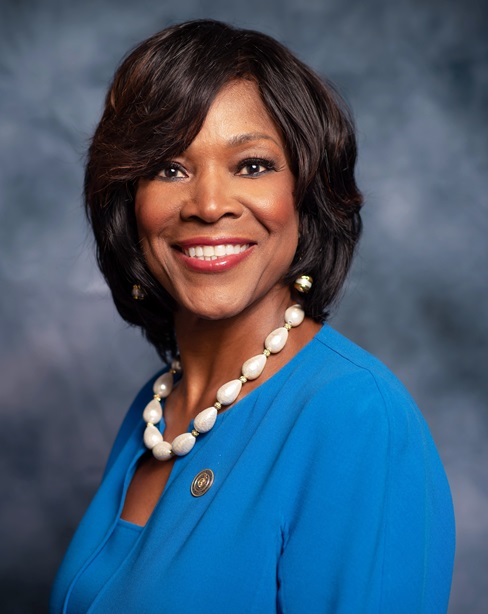National Cancer Institute Brings Together 13 Cancer Equity Leaders
Â鶹¹ÙÍø President and CEO Dr. Valerie Montgomery Rice named to group that will help Center to Reduce Cancer Health Disparities determine NCI’s diversity training, biomedical workforce development, and community outreach and engagement initiatives.
 Dr. Valerie Montgomery Rice
Dr. Valerie Montgomery Rice
President & CEO, Â鶹¹ÙÍø
By David Raths, Healthcare Innovation
The National Cancer Institute (NCI) Center to Reduce Cancer Health Disparities (CRCHD) has announced the (CEL) group, a diverse team of premier cancer research leaders who will reimagine and transform the future of cancer health equity.
CRCHD was created in 2001 to help reduce the unequal burden of cancer by:
- Leading NCI’s efforts in workforce diversity by training students and investigators from diverse backgrounds.
- Strengthening NCI’s cancer research portfolio in basic, clinical, translational, and population-based research to address cancer health disparities through collaborations with NCI Divisions, Offices, and Centers.
- Building regional networks to foster collaboration, enhance capacity in disparities research and career development, and disseminate culturally appropriate, evidence-based cancer information to underserved communities.

- Providing technical expertise, information, and advice to NCI leadership on strategic priorities, program direction, and scientific policy to strengthen diversity training opportunities and cancer health disparities research.
The Cancer Equity Leaders group will work toward three objectives:
- Assess the landscape to elucidate critical strengths and gaps in cancer equity infrastructure.
- Prioritize the critical needs for expanding institutional capacity and achieving cancer health equity.
- Develop a strategic agenda to enhance the National Cancer Plan.

Through this work, the CEL will contribute to the understanding of cancer health equity and help CRCHD determine NCI’s diversity training, biomedical workforce development, and community outreach and engagement initiatives.
CRCHD said the CEL comprises 13 renowned cancer center and medical school leaders with extensive expertise and exceptional knowledge and understanding of all stages of the cancer continuum.
In 2025, the CEL team will host an event to hear and learn diverse perspectives across the cancer community to further advance NCI’s health equity efforts.
This initiative will be co-chaired by NCI CRCHD Director Sanya A. Springfield, PhD, and Karen Winkfield, MD, PhD, Executive Director of the Meharry-Vanderbilt Alliance and Associate Director for Community Outreach & Engagement at the Vanderbilt-Ingram Cancer Center.
The CEL members are:
John Carpten, PhD
Director, City of Hope Comprehensive Cancer Center
Director, Beckman Research Institute of City of Hope
Chief Scientific Officer
Irell & Manella Cancer Center Director’s Distinguished Chair
Morgan & Helen Chu Director’s Chair of the Beckman Research Institute
City of Hope
Marcia Cruz-Correa, MD, PhD
Professor of Medicine & Biochemistry, University of Puerto Rico Medical Sciences Campus
Investigator, UPR Comprehensive Cancer Center
Chanita Hughes-Halbert, PhD
Vice Chair for Research and Professor, Department of Population and Public Health
Sciences
Dr. Arthur and Priscilla Ulene Chair in Women’s Cancer, Keck School of Medicine
Associate Director for Cancer Equity, Norris Comprehensive Cancer Center
University of Southern California
Juanita Merchant, MD, PhD
Chief of Gastroenterology and Hepatology
Regents Professor of Medicine
Associate Director for Basic Science, UACC
Interim Director, UA Comprehensive Cancer Center
University of Arizona, Tucson
Ruben Mesa, MD
President, Atrium Health Levine Cancer
Executive Director, Atrium Health Wake Forest Baptist Comprehensive Cancer Center
Enterprise Senior Vice President, Atrium Health
Vice Dean for Cancer Programs, Wake Forest University School of Medicine
The Charles L. Spurr MD Professor of Medicine, Wake Forest University School of Medicine
Valerie Montgomery Rice, MD, FACOG
President and Chief Executive Officer
Â鶹¹ÙÍø
Kunle Odunsi, MD, PhD
Director, University of Chicago Medicine Comprehensive Cancer Center
Dean for Oncology, Biological Sciences Division
The AbbVie Foundation Distinguished Service Professor
Department of Obstetrics and Gynecology
University of Chicago
Taofeek Owonikoko, MD, PhD
Director, University of Maryland Greenebaum Comprehensive Cancer Center
Marlene and Stewart Greenebaum Professor in Oncology, Department of Medicine
Executive Director, UMSOM Program in Oncology
Senior Associate Dean for Cancer Programs, University of Maryland School of Medicine
Associate Vice President for Cancer Programs, University of Maryland, Baltimore
Ben Ho Park, MD, PhD
Director, Vanderbilt-Ingram Cancer Center
Benjamin F. Byrd, Jr. Chair in Oncology
Professor of Medicine
Division of Hematology/Oncology
Vanderbilt University Medical Center
Yolanda Sanchez, PhD
The Maurice and Marguerite Liberman Distinguished Chair in Cancer Research
Professor, Department of Internal Medicine
Director & CEO, University of New Mexico Comprehensive Cancer Center
Selwyn Vickers, MD
President and CEO, Memorial Sloan Kettering Cancer Center
Cheryl Willman, MD
The Stephen and Barbara Slaggie Enterprise Executive Director, Mayo Clinic Cancer
Programs
Director, Mayo Clinic Comprehensive Cancer Center
The David A. Ahlquist, M.D. Professorship in Cancer Research
Professor and Consultant
Department of Laboratory Medicine and Pathology
Mayo Clinic College of Medicine & Science
Robert Winn, MD
Director and Lipman Chair in Oncology, VCU Massey Comprehensive Cancer Center
Senior Associate Dean for Cancer Innovation and Professor of Pulmonary Disease and
Critical Care Medicine
VCU School of Medicine
CRCHD supports 16 partnerships among investigators at institutions that serve communities with cancer health disparities, including communities served by NCI-Designated Cancer Centers, through its Partnerships to Advance Cancer Health Equity (PACHE) program.
It has established seven regional networks to foster collaboration, resource sharing, and capacity building among cancer health disparities researchers, trainees, outreach workers, and organizations through the Geographic Management of Cancer Health Disparities Program (GMaP).
CRCHD also funds more than 24 community health educators (CHEs) at 24 NCI-Designated Cancer Centers who serve as critical links between disparities researchers and racially and ethnically diverse local communities through the National Outreach Network (NON).
